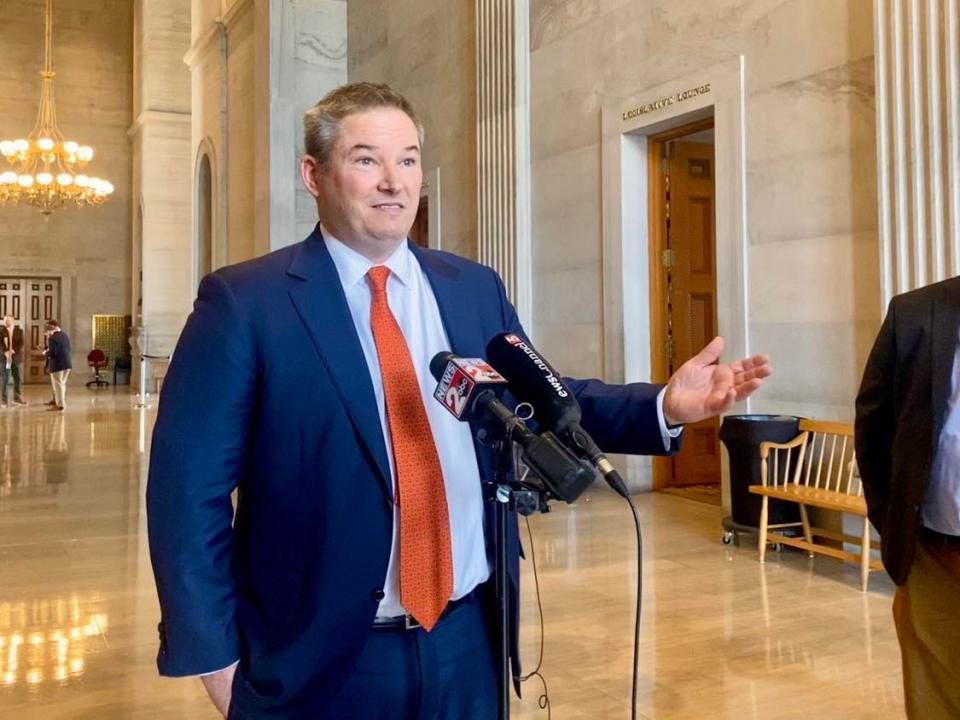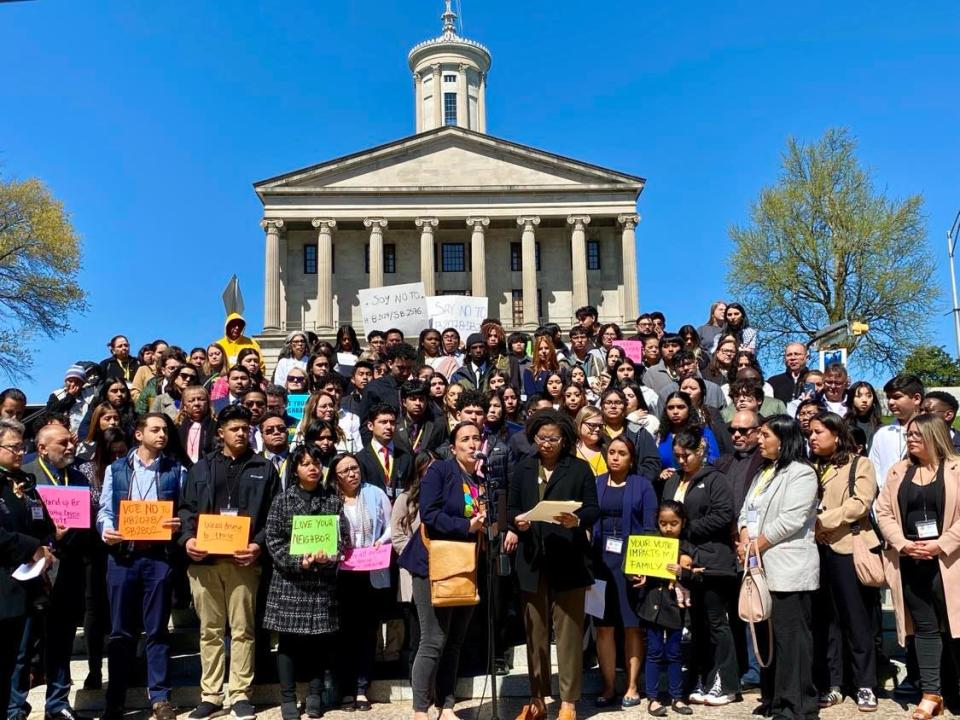The week in politics: Can House, Senate leaders close $550M gap on key legislation?
Republican leadership in the Tennessee Senate and House remain at odds on several high-profile policy proposals as the legislature enters what could be its final month of the session.
Significant fights loom over the two most sweeping legislative proposals of the entire session, a $1.9 billion franchise tax restructure and retroactive refund backed by Gov. Bill Lee, and the governor's statewide universal school choice proposal ― in addition to policy differences on issues like how many members Tennessee State University board the legislature should forcibly remove, and what types of records the Department of Tourism should be permitted to shield from public disclosure.
Though policy disagreements and backroom fights certainly aren't unusual in state politics, the ongoing tussles over the biggest tent-pole bills of 2024 foreshadow a fast and furious final weeks of session.
Senate leaders on Thursday suggested they’d play hardball with the House over proposed changes to the TSU board, effectively allowing it to terminate this summer if the House doesn’t back their version to overhaul the entire board.
"I believe the Senate is resolute in its position, and failure [by the House] to pass that bill in the form that we think is best will result in the termination of the board completely, and it would require the legislature to come back in January and form a new board," Senate Finance Committee Chairman Bo Watson, R-Hixson, said Thursday.

The most expensive differences comes in the chamber's approaches on Lee's proposed $1.9 billion franchise tax reform and retroactive refunds. While Lee's original proposal funded nearly $300 million less than fiscal analysts determined the proposal would cost the state, a funding letter sent by Finance and Administration Commissioner Jim Bryson to the Senate Finance Committee pledged to fund the $300 million difference by scrounging up interest earning growth amassed since the budget was formulated in November.
House leadership indicated Thursday that their version of the bill may take a different tack, though details have not yet been unveiled.
"We think that the bill that we sent over to them today is the best approach," Watson said Thursday, adding that if the House has other ideas, the upper chamber would consider them.
But if the administration has earmarked $300 million in excess revenue to spend on franchise tax refunds ― can it find another $250 million to cover the public school teacher health benefits and school infrastructure fees in the House version of the governor's Education Freedom Scholarships bill?
Watson said that as of Thursday, his committee has not received a funding letter from the Lee administration pledging to fund the additional spending laid out in the House version of the voucher bill.
"We're unaware of any now. We will get the administration amendment on Tuesday, and that would obviously have to be considered there," Watson told reporters. "The answer to that question sitting here today is no, we're not aware of anything like that."
Lee recently said it was "too early" to consider cost estimates or related funding for a voucher program beyond what he's already proposed in his budget. The legislation awaiting consideration in both chambers' finance committees.

Beyond spending considerations, the chambers remain lightyears apart on Lee's voucher proposal, which Senate leadership wants to push through as a tailored, though still expensive, version.
"I think there is a great deal of distance between the two chambers ― that doesn't mean it can't be resolved," Lt. Gov. Randy McNally, R-Oak Ridge, told reporters Thursday, speaking of the voucher legislation.
The House, meanwhile, is attempting to insulate a potentially unpopular program to give public dollars to private school students by wrapping in other public school changes and taking a whack at other things such as testing requirements.
On Wednesday night, the Senate added a version of their voucher bill on to Senate Bill 2787, a caption or placeholder legislation. Senate Education chair Jon Lundberg, R-Bristol, said the Senate needed a “second vehicle.”
“Obviously, we hope to get to a place together. We’ll need two vehicles, potentially, to put those together,” Lundberg said of the House and Senate versions of the Education Freedom Scholarships proposal.
By Thursday morning, House leadership had withdrawn HB 2468, their version of SB 2787. The bill could be resurrected at various junctures, but the withdrawal hints at House leadership slapping down a Senate maneuver. Lawmakers haven’t indicated the chambers are any nearer to a deal on the issue than they were a month ago.
Overall, Republican leadership continues to wave away questions about a rift between the two chambers or any lingering resentment after the special session in August that led to minimal legislation and a lawsuit against the state.
At the time, some House members were infuriated by an intransigent Senate as most in the upper chamber refused to take action beyond an absolute bare minimum of bills in August. Senators, meanwhile, were incensed by a sophomoric social media joke involving an ostrich egg, and were critical of new House rules limiting public protest, which sparked a lawsuit during the special session.
More: Amid criticism, Senate concludes initial work as House plows ahead during TN special session
House Speaker Cameron Sexton, R-Crossville, on Thursday batted down a question of a “bigger fight” between the chambers.
“I think it’s just, at the end of the day, you have two bodies and two different trains of thought,” Sexton said, noting the size differences in the chambers. “Sometimes you have different opinions, and you’ve got to work them out. So, we’ll see what happens.”
McNally said he doesn’t think there is a divide “overall” between the two chambers.
“But on certain issues, there’s a great deal of difference,” McNally said. “We do have procedures to try to resolve those differences, and we’ll probably end up on a couple of those bills going through that procedure.”

Sen. Jeff Yarbro, D-Nashville, said disagreements between the chambers are "nothing new," but they often don't bubble up until the last harried days of legislative sessions.
"We've been plagued, from day one, with really signficant, substantive disagreements between the House and the Senate. It means there is a lot of unfinished buisness left to do here in the next month," Yarbro said.
Legislature extends sexual assault lawsuit statute of limitations
Lawmakers gave final passage to a bill that will extend the statute of limitations from one year to at least three for sexual assault victims to sue.
House Bill 2216 defines sexual assault to include rape and sexual battery.
Rep. Sam Whitson, R-Franklin, said he brought the bill after he was approached by the Nashville-based Sexual Assault Center.
Extensive delays in rape kit testing have plagued Tennessee crime labs in recent years, and the SAC has worked with survivors whose rape kits languished untested while the civil statute of limitations expired. Whitson's bill would extend the state of limitations to three years for victims who may not have reported the sexual assault to law enforcement, and five years if a law enforcement report was made.
"This allows survivors to process the trauma and navigate the legal process," Whitson said.
Still, despite the extension, Tennessee's statute of limitation for rape lags behind other states, Whitson noted in a recent committee meeting. In Alabama, for example, there is no time limit in cases of rape. Arkansas has a 15-year statute of limitations for rape lawsuits, with a 10-year statute of limitations in Kentucky. Georgia law allows for four years.
Immigration rhetoric draws protests from both sides
Immigration issues were front and center at the Tennessee Capitol, as two opposing groups held rallies on the issue that is increasingly center stage in American politics.
About 150 people gathered by the Tennessee Immigrant and Refugee Rights Coalition gathered at the Capitol on Tuesday, asking lawmakers to reject legislation that singles out immigrant families.

"We're here because a handful of legislators are trying to use fear to divide our communities and distract us from the issues that really matter by trying to score cheap political points with legislation that will make life harder for immigrant families," said Judith Clerjeune, campaigns and advocacy director for TIRRC.
Among the bills the group spoke against is House Bill 2078, which would increase the penalty for transporting individuals who are unlawfully present in the United States anywhere inside Tennessee. The bill would raise the penalty from $1,000 to $5,000.
“That will just essentially make all parents be fearful of taking their kids to school, or when they get sick, they'll be scared to take them to the hospital,” UT Chattanooga student Joanna Maldonado said, translating for herself to reach the crowd in both English and Spanish. “I'm just so overwhelmed, I can't explain it fully. Families will be ripped apart if this ever happens. Families will be divided. And God forbid, should anyone be deported, those kids ― where are they going to stay?”
Also opposed by the group is Senate Bill 2576, which would require local law enforcement to communicate individuals' immigration status to federal enforcement authorities. The bill, sponsored by Sen. Brent Taylor, R-Memphis, and Rep. Rusty Grills, R-Newbern, could be up for a final vote in the Senate soon.
On the other hand, more than 100 people gathered on the Capitol steps on Wednesday for a rally against "illegal immigration" organized by right-wing website The Tennessee Conservative. The rally featured several Tennessee Republican lawmakers, such as Sen. Janice Bowling, R-Tullahoma. But several speakers frequently criticized Republican leadership, including Tennessee Senate candidate Chris Spencer, who pilloried his primary opponent Sen. Ferrell Haile, R-Gallatin, as a "RINO," or "Republican in Name Only."
The Wednesday rally attracted several men openly carrying long guns and other firearms, in addition to a handful of counter-protestors. What appeared to be a shoving match ensued between a few rally attendees and one counterprotestor, who knocked over a table in an attempt to walk up the steps away from a knot of attendees.

Skrmetti joins Apple monopoly lawsuit
Tennessee is suing Apple for an alleged monopolization of the smartphone market, joining the federal government and 15 other states in the civil antitrust lawsuit.
The Department of Justice and Tennessee Attorney General Jonathan Skrmetti announced the lawsuit on Thursday.
The suit, which was filed in New Jersey federal court, alleges Apple "undermines" products and services that would lower industry costs and make consumers less reliant on the iPhone, among other actions.
“Apple, the most valuable company in the world, stifled competition in the smartphone market at the expense of consumers,” Skrmetti said in a statement. “When companies win by innovating, consumers benefit. When companies win by kneecapping their competition, consumers suffer. Apple started as the ultimate innovator, and as someone who grew up on an Apple IIe and has been an iPhone user since launch, I hope the company returns to its innovative roots. In the meantime, Tennessee is proud to work with the U.S. Department of Justice and state AGs from around the country to ensure American consumers enjoy a free and functional market for smartphones.”
Catch up on the week
Senators disclose conflicts, administration won't release records with reasons for $1.9B tax bill
TN Senate votes to vacate Tennessee State University board despite House compromise
Senate panel makes changes, advances bill to make TN tourism records secret
TN's $1.9B franchise tax break heads to full Senate vote; Lee denies conflict of interest
TN House GOP passes bill to require schools show fetal development video
Tennessee voucher bill advances, Lee says ‘too early’ to consider higher cost estimates
Nashville advocate mulls Democratic challenge against U.S. Rep. Andy Ogles
Got a question for us?
Got a question about state politics you would like us to tackle? Let us know. Email us at mabrown@tennessean.com, vjones@tennessean.com or statehouse@tennessean.com.
This article originally appeared on Nashville Tennessean: Tennessee politics: $550M gap on House, Senate voucher and tax bills

